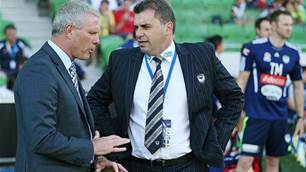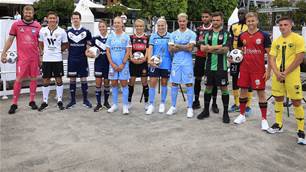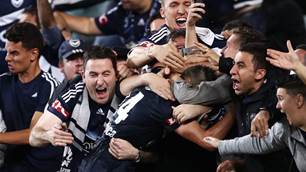Kewell-mania has done its job. V8 Supercars media are writing about A-League
It's not often the worlds of the A-League and V8 Supercars mix - very rarely, in fact.
Having worked within V8 Supercars for the last few years, I can safely say the only time the A-League comes up is in conversation with fellow journos who dabble in both sports - three that I can think of, including myself.
So when Harry Kewell turned up on the morning of the L&H 500 at Phillip Island last weekend, those two worlds unusually collided, providing a fascinating insight into how Kewell-mania translates outside of Australian football.
Here was the scene: It's the morning of the big race - the Bathurst 1000 precursor. V8 Supercars personnel's headsets crackle into life with the movements of Kewell, who, they are told, has arrived at the track.
Soon he emerges in the Ford Performance Racing (FPR - the factory Ford team) garage in racing overalls in readiness for his lap of the picturesque track with Will Davison, the former Bathurst-winner and polesitter for the race.
A crowd is building as Kewell sets off. There are the various representatives of the V8 Supercars media contingent, team personnel, a higher than usual number of hangers on and guests, and even other V8 drivers.
Kewell, meanwhile, buzzes around the track enjoying his hot lap. It's the sort of privilege few get to enjoy - typically insiders, competition winners, corporate guests and the elites (think musicians, athletes, politicians etc).
By the time Kewell returns, the garage is full. Hopping out clearly impressed with the V8 power he's just been treated to, he goes straight into an interview with Channel Seven, photos with team members and the car before being escorted into the transporter for a change of clothes.
All the while, the crowd around him builds. Journalists follow him around waiting for an elusive sound bite, the crowd in the paddock, sensing the presence of someone special, builds around FPR's garage.
Once Kewell emerges, they surround him, begging for a photograph or autograph. There's even a scream from a lucky lady who grabs a photo - a sure sign of hysteria. Such was the buzz Kewell manages to draw some of the crowd away from Craig Lowndes (V8 Supercars' Kewell), who was signing autographs 50 metres away.
Disappearing into the corporate facilities above the pits, Kewell-mania has done its job. V8 Supercars' media are suddenly writing about an A-League player, as the footage of his lap hits the airwaves and will do the rounds on the sports bulletins that night. "Will he play for Victory or that other Melbourne team?" asks one colleague.
Viewing it as a snapshot of Kewell-mania, it highlights what he brings to the table - a ticket to the sort of mainstream attention the league desperately needs, within fields that would otherwise ignore the A-League and Australian football.
But as ever with Harry and manager Bernie Mandic, the whole thing was tinged with controversy when it was announced Kewell would become an ambassador for Ford Performance Vehicles, conflicting with Football Federation Australia's deal with Hyundai.
Kewell allegedly hasn't signed the Standard Player Contract (SPC) players must sign before playing in the A-League, which forbids them from signing individual sponsorships that conflict with the league's sponsors.
Presumably Mandic has found a technicality in the contract and is thinking all sponsorship deals signed before the SPC can survive. Perhaps it'll be a matter for the courts to deal with.
But the relative rights and wrongs of that ploy mask the real question: why are there such restrictions in place?
Will the people in the market for Ford FPV GT V8, tempted to finally spend those saved up thousands by Kewell's endorsement really be choosing between Ford's finest and an economical Hyundai Getz hatchback?
Moreover, the point that needs to be stressed is that the league and clubs have no chance of growing if they are hamstrung by such restrictions, particularly given the market forces and immense competition they are forced to deal with.
Such restrictions mean doors are constantly closed. Taking the automotive industry as an example, companies such as Toyota, Holden, Kia and more, who happily throw money at other codes, are, therefore, closed to A-League clubs in the market for shirt sponsors and more.
This one-dimensional way of thinking needs to be addressed at FFA headquarters. In order to grow the league and make it economically viable for clubs, the restrictions from within the game need to be loosened.
After all, individual clubs and players such as Kewell can have more success in the market in attracting sponsors, if they're allowed to truly attack an unrestricted market.
Perhaps that's the first lesson emerging from Kewell-mania - time for the league to grow out of this protective bubble and embrace a free market.
Having watched this episode play out in a world so far removed from the A-League, it's hard to not to be even more convinced that this is the start of something big.
Related Articles

Kiwi legend: A-League can seize the day post-COVID-19

Backlash over Fox Sports new season launch













